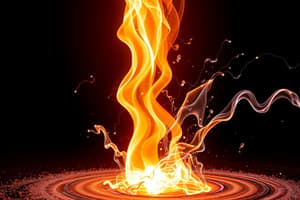Podcast
Questions and Answers
What is energy defined as?
What is energy defined as?
- The ability to remain still
- The ability to cause change (correct)
- The ability to gain momentum
- The ability to lose mass
Work transfers energy between systems.
Work transfers energy between systems.
True (A)
What unit is used to measure both energy and work?
What unit is used to measure both energy and work?
joules
Energy can be described as the ability to do __________.
Energy can be described as the ability to do __________.
What is an example of a system?
What is an example of a system?
Energy can be transferred without any work being done.
Energy can be transferred without any work being done.
What example is given to illustrate energy causing change?
What example is given to illustrate energy causing change?
Match the following types of energy with their examples:
Match the following types of energy with their examples:
Which of the following is not a form of energy mentioned?
Which of the following is not a form of energy mentioned?
Kinetic energy depends on both mass and speed of an object.
Kinetic energy depends on both mass and speed of an object.
What is kinetic energy?
What is kinetic energy?
Energy from the Sun that warms Earth is known as __________ energy.
Energy from the Sun that warms Earth is known as __________ energy.
Match the following forms of energy with their descriptions:
Match the following forms of energy with their descriptions:
How is chemical energy in gasoline best described?
How is chemical energy in gasoline best described?
All forms of energy are fundamentally different from each other.
All forms of energy are fundamentally different from each other.
What unit measures kinetic energy?
What unit measures kinetic energy?
What is the kinetic energy of a jogger with a mass of 60.0 kg moving at a speed of 3.0 m/s?
What is the kinetic energy of a jogger with a mass of 60.0 kg moving at a speed of 3.0 m/s?
Potential energy is energy that is in motion.
Potential energy is energy that is in motion.
How does the kinetic energy of an object change when its speed doubles?
How does the kinetic energy of an object change when its speed doubles?
The formula for calculating kinetic energy is KE = __.
The formula for calculating kinetic energy is KE = __.
Match the following terms with their definitions:
Match the following terms with their definitions:
By how many times does the kinetic energy of a car increase if its speed doubles from 50 km/h to 100 km/h?
By how many times does the kinetic energy of a car increase if its speed doubles from 50 km/h to 100 km/h?
A book can have potential energy even when it is not moving.
A book can have potential energy even when it is not moving.
What type of energy is stored in a stretched rubber band?
What type of energy is stored in a stretched rubber band?
What is the energy stored in a stretched rubber band or compressed spring called?
What is the energy stored in a stretched rubber band or compressed spring called?
Chemical potential energy is only relevant to food and gasoline.
Chemical potential energy is only relevant to food and gasoline.
What happens to chemical potential energy when a substance is burned?
What happens to chemical potential energy when a substance is burned?
Gravitational potential energy depends on an object's mass, Earth's gravity, and the object's ______.
Gravitational potential energy depends on an object's mass, Earth's gravity, and the object's ______.
Which equation represents the gravitational potential energy?
Which equation represents the gravitational potential energy?
Gravitational potential energy exists only in systems with two objects or more.
Gravitational potential energy exists only in systems with two objects or more.
How does the elastic potential energy of a trampoline change as a person jumps on it?
How does the elastic potential energy of a trampoline change as a person jumps on it?
Match the following types of potential energy with their descriptions:
Match the following types of potential energy with their descriptions:
Which of the following is NOT a form of energy?
Which of the following is NOT a form of energy?
A system can have both kinetic energy and potential energy at the same time.
A system can have both kinetic energy and potential energy at the same time.
Define elastic potential energy.
Define elastic potential energy.
The potential energy due to the height of an object above the ground is called __________.
The potential energy due to the height of an object above the ground is called __________.
Match the form of energy with its description:
Match the form of energy with its description:
What happens to gravitational potential energy (GPE) when a vase is moved to a higher shelf?
What happens to gravitational potential energy (GPE) when a vase is moved to a higher shelf?
Gravitational potential energy is independent of the chosen reference level.
Gravitational potential energy is independent of the chosen reference level.
How do you calculate the gravitational potential energy (GPE)?
How do you calculate the gravitational potential energy (GPE)?
The gravitational potential energy of the blue vase-Earth system is about _____ J relative to the floor.
The gravitational potential energy of the blue vase-Earth system is about _____ J relative to the floor.
What is the value of gravitational potential energy of an 8.0-kg textbook placed on a 1.25-m high desk relative to the floor? (Use g = 9.8 N/kg)
What is the value of gravitational potential energy of an 8.0-kg textbook placed on a 1.25-m high desk relative to the floor? (Use g = 9.8 N/kg)
The GPE of the green vase-Earth system is always less than the GPE of the blue vase-Earth system.
The GPE of the green vase-Earth system is always less than the GPE of the blue vase-Earth system.
What reference level would you use to calculate the GPE of a ceiling fan placed 2.5 m above the floor?
What reference level would you use to calculate the GPE of a ceiling fan placed 2.5 m above the floor?
Match the following values with their corresponding gravitational potential energy (GPE):
Match the following values with their corresponding gravitational potential energy (GPE):
Flashcards
Energy
Energy
The ability to cause change or do work.
Work
Work
Energy transfer by applying a force over a distance.
System
System
Anything you can imagine a boundary around. Can be an object, or a group of objects
Energy Transfer
Energy Transfer
Signup and view all the flashcards
Joules
Joules
Signup and view all the flashcards
Different Forms of Energy
Different Forms of Energy
Signup and view all the flashcards
Change Requires Energy
Change Requires Energy
Signup and view all the flashcards
Quantitatitive Property
Quantitatitive Property
Signup and view all the flashcards
Energy
Energy
Signup and view all the flashcards
Mechanical Energy
Mechanical Energy
Signup and view all the flashcards
Electrical Energy
Electrical Energy
Signup and view all the flashcards
Chemical Energy
Chemical Energy
Signup and view all the flashcards
Radiant Energy
Radiant Energy
Signup and view all the flashcards
Kinetic Energy
Kinetic Energy
Signup and view all the flashcards
Mass and Speed
Mass and Speed
Signup and view all the flashcards
Energy Forms
Energy Forms
Signup and view all the flashcards
Elastic Potential Energy
Elastic Potential Energy
Signup and view all the flashcards
Chemical Potential Energy
Chemical Potential Energy
Signup and view all the flashcards
Gravitational Potential Energy
Gravitational Potential Energy
Signup and view all the flashcards
GPE Equation
GPE Equation
Signup and view all the flashcards
Energy Conversion (Burning)
Energy Conversion (Burning)
Signup and view all the flashcards
Potential Energy (General)
Potential Energy (General)
Signup and view all the flashcards
Gravity (g)
Gravity (g)
Signup and view all the flashcards
Height and GPE
Height and GPE
Signup and view all the flashcards
Kinetic Energy
Kinetic Energy
Signup and view all the flashcards
Potential Energy
Potential Energy
Signup and view all the flashcards
Elastic Potential Energy
Elastic Potential Energy
Signup and view all the flashcards
Chemical Potential Energy
Chemical Potential Energy
Signup and view all the flashcards
Gravitational Potential Energy
Gravitational Potential Energy
Signup and view all the flashcards
Kinetic Energy
Kinetic Energy
Signup and view all the flashcards
Potential Energy
Potential Energy
Signup and view all the flashcards
Mass (in KE)
Mass (in KE)
Signup and view all the flashcards
Velocity (in KE)
Velocity (in KE)
Signup and view all the flashcards
Elastic Potential Energy
Elastic Potential Energy
Signup and view all the flashcards
Gravitational Potential Energy
Gravitational Potential Energy
Signup and view all the flashcards
Relation between mass and KE
Relation between mass and KE
Signup and view all the flashcards
Relation between velocity and KE
Relation between velocity and KE
Signup and view all the flashcards
Gravitational Potential Energy (GPE)
Gravitational Potential Energy (GPE)
Signup and view all the flashcards
Reference Level
Reference Level
Signup and view all the flashcards
GPE Calculation
GPE Calculation
Signup and view all the flashcards
GPE units
GPE units
Signup and view all the flashcards
GPE and Height
GPE and Height
Signup and view all the flashcards
Changing the Reference level
Changing the Reference level
Signup and view all the flashcards
GPE and Mass
GPE and Mass
Signup and view all the flashcards
GPE Relative to Floor
GPE Relative to Floor
Signup and view all the flashcards
Study Notes
Describing Energy
- Energy is the ability to cause change
- Energy limits what can happen in any system
- Energy is transferred when work is done
Types of Energy
- Kinetic Energy: Energy due to motion; depends on mass and speed (KE = 1/2mv²)
- Example: A moving car, a falling object
- Potential Energy: Stored energy due to position or configuration
- Gravitational Potential Energy: Stored energy due to an object's height relative to a reference point (GPE = mgh)
- Example: An apple on a tree
- Elastic Potential Energy: Stored energy in a stretched or compressed object
- Example: A stretched rubber band
- Chemical Potential Energy: Stored energy in chemical bonds
- Example: Food, gasoline
- Gravitational Potential Energy: Stored energy due to an object's height relative to a reference point (GPE = mgh)
- Radiant Energy: Energy that travels as waves
- Example: Sunlight, heat
- Mechanical Energy: Sum of kinetic and potential energy in a mechanical system
- Example: A pendulum
- Electrical Energy: Energy related to the movement of electrically charged particles; potential
- Example: In a circuit
- Thermal Energy: Energy due to the motion of particles in a substance
- Example: Heat from a stove
Studying That Suits You
Use AI to generate personalized quizzes and flashcards to suit your learning preferences.




